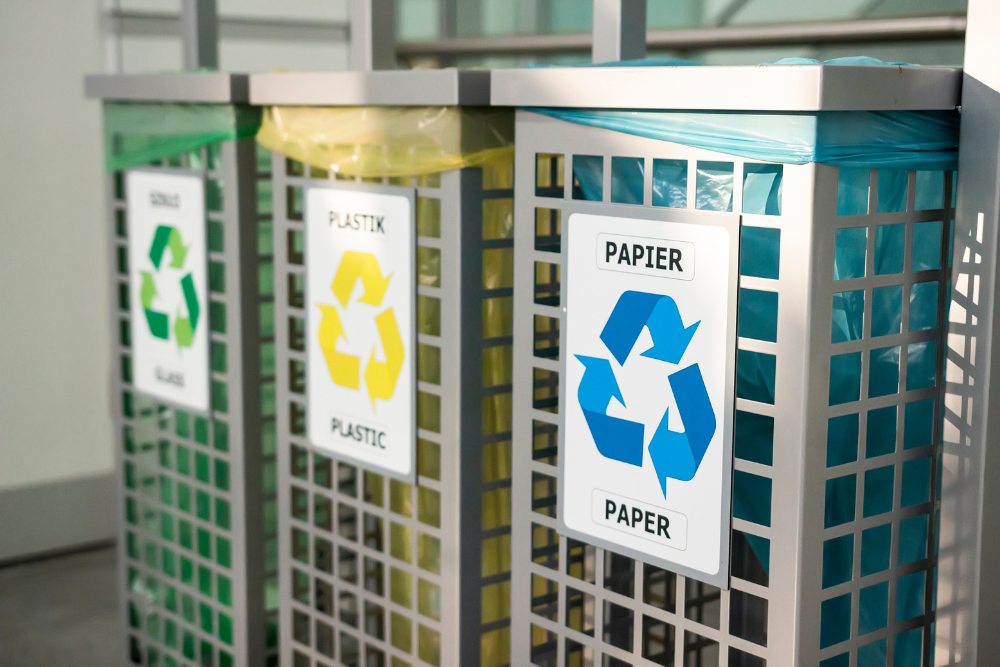
The Benefits of E-Waste Disposal for a Healthier Planet
September 19, 2025
How Scrap Metal Removal Helps Reduce the Amount of Waste in Landfills
September 22, 2025E-Waste Disposal Why You Should Never Throw Away Your Old Electronics
In today’s fast-paced digital age, electronic devices are replaced at lightning speed, leaving homes and offices filled with outdated gadgets. The easy choice is often to toss them into the trash, but this decision carries serious consequences. Old electronics are not just clutter; they contain hazardous materials that can harm the environment and valuable resources that could be reused. Proper e-waste disposal is more than a responsible act—it is an environmental necessity. Understanding why electronics should never be discarded with regular garbage can help create sustainable habits and ensure a healthier planet for generations to come.
Understanding the dangers of toxic materials in electronics
Many people do not realize that electronics are built with materials that can become highly toxic when improperly discarded. Devices such as smartphones, laptops, and televisions often contain lead, mercury, cadmium, and arsenic. These substances may seem harmless while sealed within the product, but once the device breaks down in a landfill, they can leach into soil and water systems. This contamination threatens drinking water sources, agricultural land, and even local ecosystems, putting both human health and wildlife at risk.
Proper e-waste disposal ensures that these toxic elements are carefully handled and diverted from landfills. Recycling facilities are equipped with processes to extract and neutralize harmful substances, preventing them from seeping into the environment. By making the decision not to throw away old electronics, individuals play a vital role in protecting their communities
How improper disposal harms the environment
When electronics are tossed into household trash, they typically end up buried in landfills or incinerated. Both outcomes release harmful pollutants into the environment. Incineration produces toxic fumes, including dioxins and heavy metals, which contribute to air pollution and respiratory issues. Meanwhile, landfill disposal often results in hazardous chemicals seeping into groundwater, contaminating soil, and causing long-term environmental degradation. These impacts can persist for decades, harming wildlife and ecosystems far from the original disposal site.
Improper disposal also prevents the recovery of valuable components that could otherwise be reused or recycled. Items such as copper wiring, aluminum casings, and even precious metals like gold are wasted when discarded improperly. This loss drives demand for new mining and manufacturing, intensifying environmental damage. Choosing proper e-waste recycling keeps dangerous pollutants out of the air and soil while ensuring resources are preserved. Responsible choices create a cleaner, safer environment for everyone.
Recovering valuable materials from old electronics
Electronics contain more than hazardous elements—they also hold precious resources. Inside circuit boards and wiring lie gold, silver, copper, and palladium, all of which are in limited supply. Recycling old electronics allows these valuable materials to be reclaimed, reducing the need for new mining operations that devastate ecosystems. Every device recycled contributes to resource conservation and lessens the environmental toll associated with raw material extraction.
In addition to metals, recyclable plastics and glass components can also be recovered from discarded electronics. These materials are processed and used in manufacturing new devices, creating a sustainable loop of reuse. Without proper recycling, all of these resources are lost forever.

Protecting human health through safe disposal
Discarded electronics pose significant risks to human health when they are improperly disposed of. Toxic chemicals such as mercury and cadmium can enter food and water supplies, leading to long-term exposure for nearby communities. Health issues linked to these contaminants include neurological disorders, kidney damage, and developmental problems in children. The dangers are not immediate but build silently over time, creating widespread harm if e-waste is not properly managed.
Safe disposal ensures that hazardous materials are removed and treated before they can pose risks. Recycling facilities are designed with safeguards to handle toxins responsibly, preventing them from spreading into the environment. Choosing to recycle electronics is not just about protecting nature—it also safeguards the health of families and communities.
The global problem of e-waste accumulation
E-waste is not just a local issue; it is a global crisis. With technology advancing rapidly, millions of tons of electronic waste are generated worldwide each year. Developing countries often bear the burden of improperly disposed electronics, receiving shipments of discarded devices from wealthier nations. These items frequently end up in unsafe recycling operations where workers are exposed to toxic materials without proper protection. The problem crosses borders and affects communities worldwide.
Addressing this issue requires individuals everywhere to take responsibility for their electronics. Proper recycling reduces the pressure on developing regions and helps build global sustainability. By preventing electronics from entering informal or unsafe waste streams, people ensure that recycling is handled with care. The global e-waste problem is overwhelming, but individual decisions at the local level have the power to shift the trend. Responsible disposal is a shared duty with far-reaching impacts.
Why landfill space should not be wasted on electronics
Landfills are filling up at alarming rates, and much of the waste they contain could have been diverted through recycling. Electronics, in particular, take up unnecessary space and contribute to the strain on waste management systems. Unlike biodegradable materials, old devices do not break down safely. Instead, they sit for decades while leaching harmful substances. Wasting landfill capacity on items that could have been recycled is both inefficient and dangerous.
Properly recycling electronics relieves pressure on landfill space and ensures that only materials with no alternative disposal method end up there. By diverting electronics, communities save land for other purposes while minimizing environmental risks. As populations grow, landfill space becomes increasingly valuable. Making the decision to recycle electronics is a practical way to conserve this space and support waste management systems. It turns unnecessary waste into an opportunity for sustainability and efficiency.
Creating economic opportunities through recycling
Recycling electronics not only protects the environment but also stimulates the economy. The process of collecting, dismantling, and repurposing old devices generates jobs in specialized recycling facilities. These jobs support local economies and foster industries focused on sustainable practices. Unlike landfill disposal, recycling creates value from discarded materials and provides long-term benefits for communities.
Beyond employment, recycling also supplies industries with essential raw materials. Extracting metals and plastics from electronics reduces the need for expensive and environmentally damaging mining operations. This conservation lowers production costs while supporting industries committed to sustainability. When people choose to recycle electronics instead of throwing them away, they contribute to a system that benefits both the environment and the economy. It transforms waste into opportunity, proving that responsible disposal is more than just a moral obligation—it is an investment in future growth.
Encouraging sustainable consumer behavior
How individuals handle old electronics reflects broader consumer habits. Throwing devices away perpetuates a cycle of waste, while recycling encourages responsibility and mindfulness. When people understand the value of their discarded items, they are more likely to make sustainable purchasing choices in the future. This shift in perspective reduces demand for products with short lifespans and promotes a culture of reuse.
Donating working electronics or recycling outdated devices encourages others to follow similar practices. Over time, these habits create a ripple effect, shaping communities that prioritize sustainability. Encouraging sustainable behavior starts with simple actions, like choosing not to throw away electronics. These everyday decisions inspire long-term changes in how resources are valued. Responsible e-waste management sets the stage for a society that views consumption through the lens of environmental impact, leading to smarter choices and healthier outcomes for the planet.
The role of legislation in proper e-waste management
Many regions have introduced laws and regulations aimed at curbing improper e-waste disposal. These rules are designed to ensure that electronics are handled safely, minimizing environmental and health risks. Regulations often require manufacturers to take responsibility for the products they produce, creating systems for take-back and recycling. Such measures place accountability on both companies and consumers to act responsibly with electronic waste.
Legislation alone, however, cannot solve the issue without public cooperation. Individuals must participate by disposing of electronics in designated facilities and avoiding household trash bins. The combination of policy and public action creates a comprehensive approach to e-waste management. By respecting regulations and choosing sustainable options, communities reinforce the effectiveness of these systems. Laws may provide the framework, but individuals supply the action. Together, this partnership ensures that electronic waste is addressed in ways that prioritize safety and sustainability.
Steps individuals can take to recycle electronics properly
Proper e-waste recycling begins with awareness and simple steps. The first step is identifying local facilities that accept electronics for recycling. Many municipalities and private companies provide collection events or drop-off centers. Another option is donating functional devices to organizations that can reuse them. These actions ensure that electronics are diverted from landfills and placed into safe recycling streams.
Individuals can also reduce e-waste by extending the lifespan of their devices. Repairing or upgrading equipment rather than replacing it helps minimize waste. When replacement is necessary, choosing durable products with recycling programs attached makes disposal easier. Even small decisions, such as storing old electronics until the proper disposal option is available, prevent them from entering the wrong waste stream. By following these steps, people play an active role in managing e-waste responsibly. Each effort contributes to a collective solution that protects the environment.
Conclusion
North Bay Junk Removal specializes in safe and responsible junk removal with a strong focus on sustainability. Serving Santa Rosa, CA, their team is dedicated to handling e-waste and other materials in ways that protect both the environment and the community. Instead of sending electronics to landfills, they prioritize recycling and responsible disposal, ensuring that harmful materials are diverted and valuable resources are recovered. Their approach reflects a commitment to eco-friendly practices that go beyond convenience, offering residents peace of mind that their unwanted items are being managed responsibly.
For those seeking reliable junk removal services, North Bay Junk Removal provides expertise and care in every project. With an emphasis on proper recycling methods, they help clients reduce waste while supporting environmental health. To schedule service or learn more about their eco-friendly approach, call 707-478-6817. Choosing professional junk removal is more than a service—it is a step toward a greener future.




